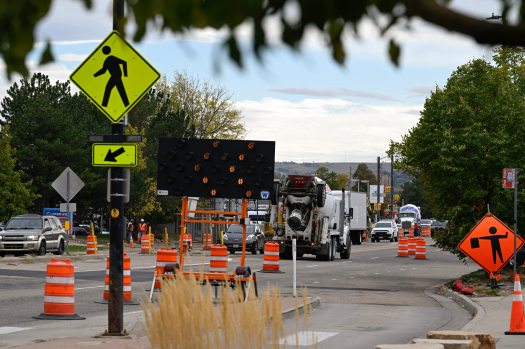UPDATE: The Boulder City Council has just approved a critical transportation management fee designed to raise $6.2 million for urgent infrastructure projects, voting 6-3 in a session held on June 15, 2023. This fee, imposed on most privately owned properties, comes as a necessary response to the city’s pressing transportation needs, which have been exacerbated by years of neglect and rising costs.
The decision reflects a growing urgency within the council to address approximately $6.4 million in annual unfunded maintenance needs, including vital repairs for roads and bridges. Council members Ryan Schuchard, Matt Benjamin, Tina Marquis, Nicole Speer, Mayor Pro Tem Lauren Folkerts, and Mayor Aaron Brockett supported the measure, while Mark Wallach, Taishya Adams, and Tara Winer opposed it.
Concerns were raised during the meeting about the potential impact on businesses still recovering from the aftermath of the COVID-19 pandemic. Many stakeholders argue that this fee might further strain local businesses and residential owners. Councilmember Wallach voiced apprehensions, stating, “I do not think that the engagement that’s being sought by the business community and residential owners is merely on the implementation. They need to be involved in the broader conversation.”
The proposed fee structure is as follows: non-residential property owners—including private schools and hospitals—will incur charges ranging between $11 and $160 per 1,000 square feet annually, depending on their land use category. For residential properties, the fee is set at $54 annually for single-family homes and $42 for multi-family residences. Notably, the Boulder Valley School District and the University of Colorado Boulder will be exempt from the fee, although they may consider contributing to a collaborative fund.
Despite the council’s decision, a motion to delay implementation until early next year narrowly failed, showcasing a divided council on this contentious issue. Critics argue that more time is needed for community outreach to ensure that residents and businesses fully understand the fee’s implications. Councilmember Adams, who voted against the measure, emphasized the potential burden on renters, stating, “There is a possibility that they up the lease price in anticipation for something that would come.”
Local businesses, represented by the Boulder Chamber of Commerce, have also expressed reservations. Senior Director of Policy Programs, Jonathan Singer, articulated the chamber’s stance, urging the city to adopt more collaborative funding approaches that consider the economic realities faced by local employers. “Life significantly changed for residents and businesses since then,” he remarked.
As Boulder grapples with its transportation infrastructure challenges, the council’s decision marks a significant step forward, but also raises critical questions about its impact on residents and businesses. The final reading of the ordinance is expected soon, but for now, the urgency for better funding mechanisms remains clear.
Looking ahead, the city plans to enhance community engagement efforts to address the concerns of all stakeholders. As this situation evolves, residents and business owners will need to stay informed about how these changes will affect their daily lives.







